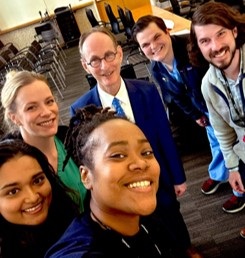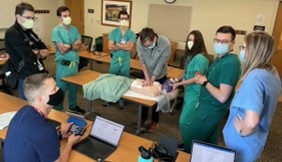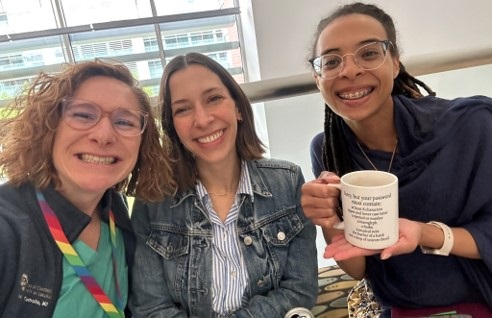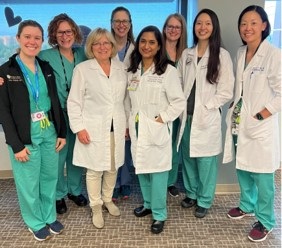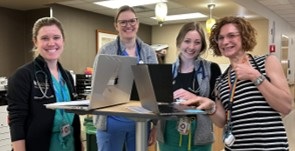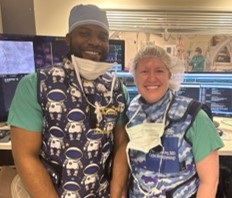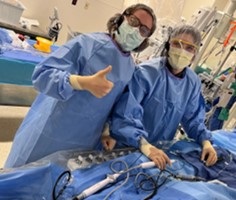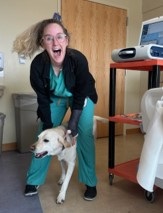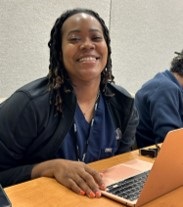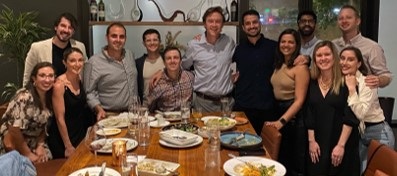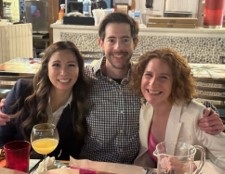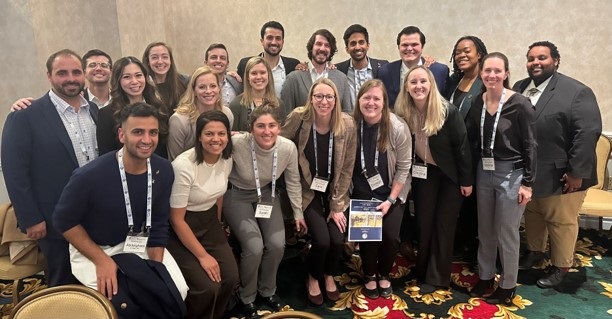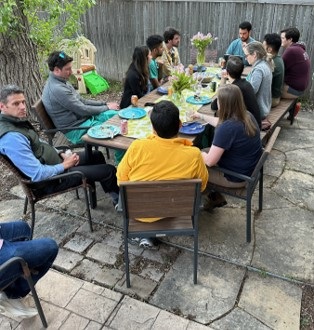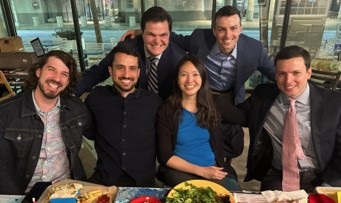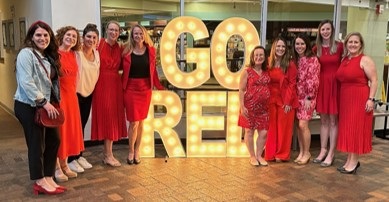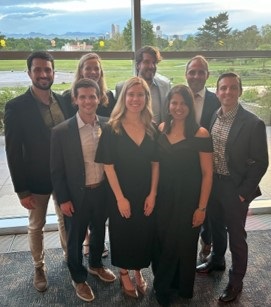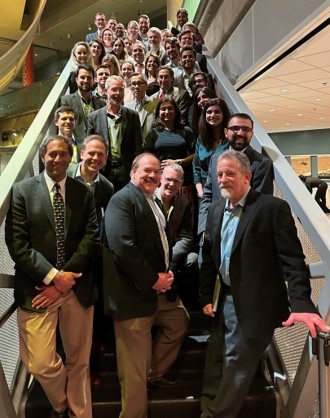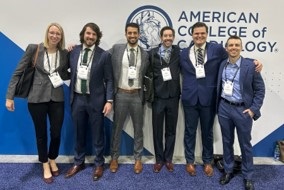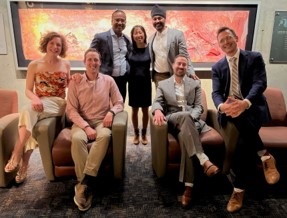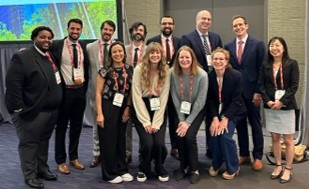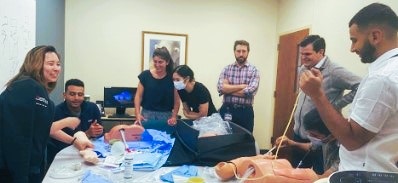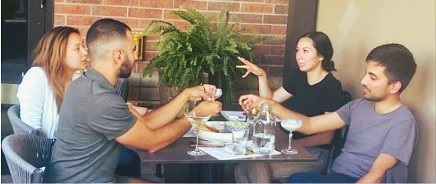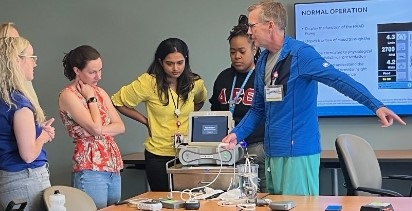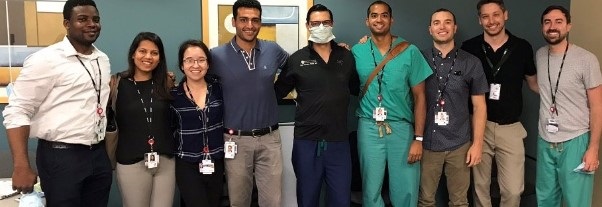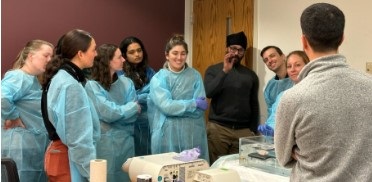Cardiovascular Disease Fellowship
Program Director: Alexis Tumolo, MD
Associate Program Director: Christine Sailer, MD
Cardiovascular Disease (General Cardiology) Fellowship Aims ![]()
Our overarching goals are to prepare our fellows to become clinically adept, compassionate and accomplished cardiologists who will become leaders in our field. Specifically, this involves:
- Practice of and competency in all aspects of contemporary cardiology, including those unique to a tertiary University practice.
- Preparation for either subspecialty training or general clinical practice with an appreciation of the need for continuous learning and a reliance on evidence-based practice.
- Acquisition of skills and leadership in medical education in clinical and classroom environments.
- Preparation for future careers distinguished by scholarship, with exposure to and participation in research across the spectrum from discovery science, clinical research, and health outcomes.
- Appreciation of professionalism and collaboration across the entire spectrum of health care related activity.
- Demonstration of respect and advocacy for diverse patients, colleagues, multidisciplinary team members and learners.
- Exposure to emerging technologies and science in cardiovascular care and interventions.
- Development of leadership skills across the healthcare spectrum.
Fellowship Program Curriculum ![]()
Both practical and didactic training is provided in all areas of cardiovascular medicine, including the following:
- Adult cardiology including coronary care
- Adult congenital heart disease
- Electrocardiography
- Cardiac electrophysiology and pacemaker therapy
- Cardiac catheterization including interventional cardiology
- Nuclear cardiology
- Echocardiography
- Exercise testing
- Advanced heart failure and transplant
- Vascular medicine
- Cardiac MRI & CT
- Pulmonary hypertension
- Preventive cardiology
- Cardiac rehabilitation
Clinical rotations include inpatient experiences (cardiac ICU, cardiology consults, electrophysiology consults), cardiovascular imaging acquisition and interpretation (echocardiography, cardiac stress testing, advanced imaging [nuclear, CT, MRI]), cardiac catheterization laboratory training, and hybrid inpatient/outpatient experiences (adult congenital cardiology, community practice).
All fellows participate in self-directed research rotations, and have opportunities to craft additional rotations based on professional goals. First year rotations comprise a core of cardiovascular experiences (cardiac ICU, consults, non-invasive and cath lab) at all three clinical sites, while second and third year rotations are more tailored to fellows’ needs and interests.
Academic Days ![]()
When: Every 4th Tuesdays
Our Academic Days (AD) curriculum is a special learning opportunity for our fellows, with monthly, longitudinal disease topic-themed days. During ADs, all fellows come together in the classroom for didactics, small group work, case-based learning, and hands-on and simulation learning with experts in the field. It is a wonderful opportunity to dive deeply into learning and interface with cardiovascular leaders and potential mentors. Our fellows are not contacted for clinical care during ADs so that they can focus on learning. An additional strength of this curriculum is the development of teamwork and camaraderie with their co-fellows. Examples of AD topics include: Acute Coronary Syndrome, Basics & Advanced Concepts; EP Device Day; Adult Congenital Heart Disease; Healthcare Disparities; Aortic Stenosis; Pericardial Disease; and Pregnancy & Women Heart Disease. Our heart failure-focused AD is combined with our Colorado Heart Failure Summit and Colorado ACC Conference, which allows fellows to participate in this excellent event. See below for pictures from our Academic Days!
Additional Conferences ![]()
New Fellows Bootcamp
We have integrated ongoing hands-on and case-based education into our general fellowship program. This curriculum begins on the first day of fellowship, with a simulation "boot-camp" during orientation to introduce fellows to the basics of procedural skills in cardiology. This begins with interactive foundations of management of cardiac emergencies, and includes hands-on work with transthoracic and transesophageal echocardiography, pacemaker and ICD programmers, and cardiac catheterization lab equipment. From this point forward, through periodic simulation-based activities in our Academic Days, fellows build upon their skills to enhance procedural proficiency through simulation-based mastery learning.
Case Conference
When: Third Tuesdays, 12-1 pm
CCU and Heart Failure service fellows will present interesting cases that highlight multidisciplinary management and complex decision-making. These conferences are fellow led, with input and engagement from teaching faculty.
Echo Imaging Conference
When: Second Tuesdays, 12-1 pm
Anchored in high-yield topics for the cardiovascular echo boards, this conference focuses on in-depth discussion of echocardiographic case studies. This series is fellow led, with input and engagement from teaching faculty.
ECG Conference
Integrated into Academic Days
This interactive conference offers review of arrhythmias for fellows to advance their ability in ECG interpretation. Faculty also present a review of pacemakers and EP studies. Beyond this lecture series, fellows with career pathway interests in electrophysiology are invited to attend daily teaching EP service conferences as well as our local Colorado Arrhythmia Symposium.
Cardiovascular Systems Review Conference (Morbidity & Mortality)
When: Fourth Tuesdays, 7-8 am
The goal of the M&M conference is to provide a safe venue to identify areas for improvement in patient care, while promoting professionalism, integrity, and transparency. Cardiology fellows will gain experience analyzing adverse events, engaging relevant stakeholders and leading a systems-based discussion with an engaged, multi-disciplinary audience. Fellows are supported by multiple faculty members and staff (nurses, quality specialists, risk managers). Together, we hope to promote a culture of continuous improvement in the division.
